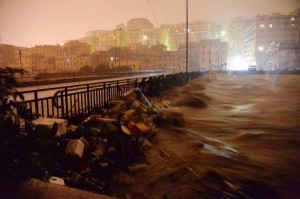 It is ten o’clock on October 9th. It had been raining since the early morning but during the night the rain became stronger. The council did not raise the alarm, so the Genoan citizens were not that worried. An AEGEE event was planned for this night: Thursday Night Fever, but the board members decided wisely to cancel it. Looking at the streets, nobody was there; just a few cars battling through a terrible rainstorm. In the memory of the inhabitants there is still the image of the flood of November 2011, when the mud and the rain desolated the neighborhood of Marassi, Quezzi, Borgo Incrociati, Foce and San Fruttuoso, as well as the wonderful Cinque Terre.
It is ten o’clock on October 9th. It had been raining since the early morning but during the night the rain became stronger. The council did not raise the alarm, so the Genoan citizens were not that worried. An AEGEE event was planned for this night: Thursday Night Fever, but the board members decided wisely to cancel it. Looking at the streets, nobody was there; just a few cars battling through a terrible rainstorm. In the memory of the inhabitants there is still the image of the flood of November 2011, when the mud and the rain desolated the neighborhood of Marassi, Quezzi, Borgo Incrociati, Foce and San Fruttuoso, as well as the wonderful Cinque Terre.
Genova is a city built on rivers: Bisagno, Sturla, Fereggiano, Chiaravagna, Polcevera. Those are particularly dangerous but also other torrents are threatening everywhere in Liguria. At eleven, the streets were dark: no electricity and danger could be sensed from the river Fereggiano. Within ten minutes the amount of water on the streets became worrisome. The water had been coloured brown in just a few seconds: it is mud now. The authorities announced bad news: the rivers Bisagno, Fereggiano and Sturla have flooded. It has happened again. The rain is weaker now, but it is too late. Borgo Incrociati, Brignole Station, Corso Torino and Via XX Settembre are under water again, just as they were three years ago. This time, one person died: he was waiting for the bus right at the moment when the river Bisagno flooded. He had no chance.
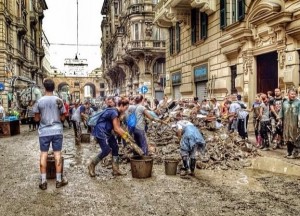 It is night and darkness is everywhere. We cannot do anything now; we have to wait until the morning after. No work, no university, no school. On October 10th, the authorities raise the alarm: “Don’t go out, more rainstorms are coming!”. But it is not possible to wait: the drains are obstructed by mud and if more floods come, it will be a complete disaster (luckily the announced second flood never arrived). The streets are full of countless young people shoveling mud in the rain. They call them “Angeli del fango” (mud angels), and from the moment they woke up they started working for the flood victims.
It is night and darkness is everywhere. We cannot do anything now; we have to wait until the morning after. No work, no university, no school. On October 10th, the authorities raise the alarm: “Don’t go out, more rainstorms are coming!”. But it is not possible to wait: the drains are obstructed by mud and if more floods come, it will be a complete disaster (luckily the announced second flood never arrived). The streets are full of countless young people shoveling mud in the rain. They call them “Angeli del fango” (mud angels), and from the moment they woke up they started working for the flood victims.
Everybody in the country was watching. The flood victims, traders and merchants cheer the boys on. One of them said “You do not deserve us”. It seemed as if Genova had lost its’ Youth. Sucked into a black hole from the grumbling of the “oldest city” in Italy. Forgotten or self-segregated in their bedrooms, in front of the screen of a smartphone. Only the “excesses” of their nightlife displayed in the media. Instead, the dawn after the flood brought them back onto the streets. Not to complain this time, but to shovel, wash, clean, straighten out. The hands, also naked, in mud and not on their keyboards to be indignant on social networks. They did not wait until the end of the alert, which already came too late. They did not ask for permission. They took the city.
Now the city is clean, but the work is not finished yet. We have to take this tragedy as an opportunity to raise the awareness of the importance of sustainability and the care for our land, not only in Genova, or in Italy, but in the whole of Europe. As we are AEGEEans we can do it. What happened in Genova, for the second time in three years, causes indignation and rage. In Italy we feel indignation and rage at least once a day for what is happening in this peninsula.
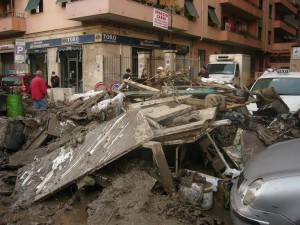 In AEGEE we’re always encouraged by the whole network to take part in the European level, but when things like this occure, we are pushed to wonder: what is the point? How can you think about the Strategic Plan when your house is covered in mud and the only thing you can do is to shovel it out?
In AEGEE we’re always encouraged by the whole network to take part in the European level, but when things like this occure, we are pushed to wonder: what is the point? How can you think about the Strategic Plan when your house is covered in mud and the only thing you can do is to shovel it out?
There are territories in Italy which are almost uninhabitable, but people and youngsters are trying their best to live there: these are places in which there is a high percentage of cancer caused by a toxic garbage dump; territories with rivers whose path is obstructed by cement causing them to flood when it rains; in which building your own house will inevitably mean you will see it disintegrated by a earthquake, etc.
This is not about focusing on just a nation and not the continent, this is about living in an environment where an AEGEE antenna is located and without keeping your head in the sand. The burning question is: can AEGEE-Europe give a voice to local problems? Can issues on the European level get closer to the local level?
Maybe it is not only the italian- speaking antennae who live with the same problems. It’s not about solidarity or money donations, it is about having the political weight at the European level and taking advantage of it on a local level. Of course, solidarity and financial donations are important, too. They deal with these tragedies in the immediate aftermath.
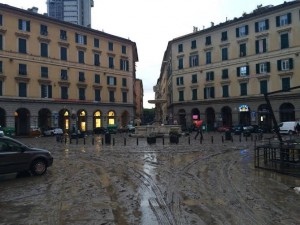 What happened in Genova, DOES NOT stay in Genova. We cannot keep on ignoring the flooding emergency and all the other natural disasters which hit Europe this year. In other words we want AEGEE to be more active from this point of view by introducing a new European project aimed to inform and discuss the way in which each country should prevent and react to these kinds of emergency. Why is this idea so important to us? Because, on the one hand, we are talking about an ongoing problem; on the other hand we want to support all those people who lost everything because of natural disasters and who are even angrier because their own country ignores their needs and is not doing enough for them.
What happened in Genova, DOES NOT stay in Genova. We cannot keep on ignoring the flooding emergency and all the other natural disasters which hit Europe this year. In other words we want AEGEE to be more active from this point of view by introducing a new European project aimed to inform and discuss the way in which each country should prevent and react to these kinds of emergency. Why is this idea so important to us? Because, on the one hand, we are talking about an ongoing problem; on the other hand we want to support all those people who lost everything because of natural disasters and who are even angrier because their own country ignores their needs and is not doing enough for them.
When Genova was hit by the floods, many Rainbow members wanted to go there as volunteers but it was not easy because AEGEE is not an association registered to Protezione Civile (the Italian association that acts in similar cases). For many other reasons it was impossible to go there and it made us think: what can we do in similar cases?
First of all, AEGEE should register to the Protezione Civile or an similar association; it is not an easy step because each country has its own institution and AEGEE functions does not have a national level. Consequently, we could decide to register each local antenna to its national association or to register AEGEE Europe to every national equivalent of the Protezione Civile. Being a volunteer in emergency cases is both interesting and useful but it is not enough.
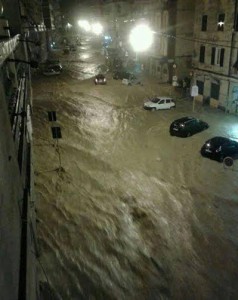 The second step involves each local spreading information about the catastrophe to make people aware of what is happening. It can easily be done through social media but also by organising conferences or international events in which people not only present information about the situation but also debate about prevention and social responsibility.
The second step involves each local spreading information about the catastrophe to make people aware of what is happening. It can easily be done through social media but also by organising conferences or international events in which people not only present information about the situation but also debate about prevention and social responsibility.
The third step could be called “long distance help”; it consists simply in the provision of basic human needs and the transmission of an IBAN code to transfer money to associations that could directly help people of the affected areas.
This is in brief our modest but serious proposal. It could be improved but we can work together on this project to make it happen. We know that it is impossible to stop an earthquake, but we are AEGEEans, we pursue a united and borderless Europe. So let us be really united in the time of need.
How to help?
AEGEE-Genova created a campaign called #ForzaGenova to collect money for Genova flood victims. They are donating all this month’s income from local events and merchandise. If you want to be part of this campaign just donate to this bank account:
Bank account SEPA
Card owner: Benedetta Sirianni
IBAN IT 16 S 07601 05138 225240425244
Comments: (donator) Crowfounding floodGenova2014
If each antenna will donate a symbolic amount of 10 Euro we can easily reach the goal of 2000 Euro. Genova would be very grateful.
Written by Savino Delfino, AEGEE-Genova, Lisa Gregis, AEGEE-Bergamo, Larisa Smajlagic and Angie Zandonà, AEGEE-Verona
Pictures courtesy of Angeli col fango sulle magliette Facebook Page

